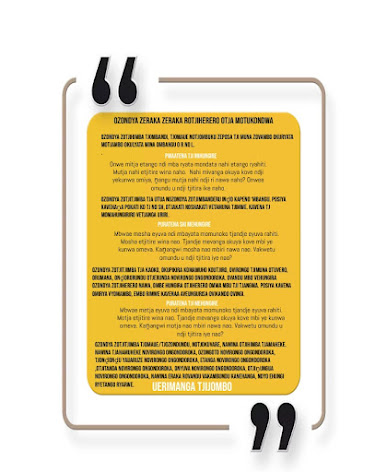Ozondya zeraka rOtjiherero otja motukondwa
ozondya zOtjihimba
tjOmbandi, tjOmaue notjOmbuku zeposa tji muna zovambo okuryata motjambo
okulyata wina ombangu oR noL.
Pwaatena tji
mihungire
Onwe mitja etango
ndi mba ryata mondata nahi etango ryahiti. Mutja nahi etjitire wina naho. Nahi mivanga okuya kove ndji yekunwa omiya, ṋangu
mutja nahi ndji ri nawa naho? Onwee omundu u ndji tjitira ike naho.
Ozondya zOtjitjimba
tja Utua nozondya zOtjimbanderu inḓo kapeno ‘mbangu. Posiya kavehaṋa pokati ko
Tj no Sh, Otjakati nOshakati vetamuna tjimwe. Kavena Tj momahungiriro vetjanga
uriri.
Puratena shi
mehungire
Mbwae mesha eyuva
ndi mbayata momunoko tjandje eyuva rahiti. Mosha etjitire wina nao. Tjandje
mevanga okuya kove mbi ye kunwa omeva. Kaṋangwi mosha nao mbiri nawa nao.
Vakwetu omundu u ndji tjitira iye nao?
Ozondya
zOtjitjimba tja Kaoko, okupikira komamuho koutjiro, ovirongo tjimuna Otuvero,
Orumana, Onḓororundu otjerunda novirongo ongondoroka. Ovandu mbo vehungira
ozondya zOtjiherero nawa, ombe hungira Otjiherero omwa mbu tji tjangwa. Posiya
kavena omirya vyomambo, embo rimwe kavenaa aveungurisa ovikando ovingi.
Puratena tji
mehungire
Mbwae metja eyuva
ndi mbayata momunoko tjandje eyuva rahiti. Motja etjitire wina nao. Tjandje
mevanga okuya kove mbi ye kunwa omeva. Kaṋangwi motja nao mbiri nawa nao. Vakwetu
omundu u ndji tjitira iye nao?
Ozondya zOtjitjimba tjOmaue/tjOzondundu, notjOkuvare,
nawina Otjihimba tjaMaheke. Nawina tjaHamuheke novirongo ongondoroka, Ozongoto
novirongo ongondoroka, tjOnḓonḓu yaUaruze novirongo ongondoroka, Etanga
novirongo ongondoroka ,Otjitanda novirongo ongondoroka, Onyuva novirongo
ongondoroka, otjiṋungua novirongo ongondoroka, nawina eraka rovandu vaKambundu
kaNehanga, ndyo ehungi ryetango ryarwe.
Since people in a local area are more likely to
converse with one another, they pick up new variations from each other that are
not shared with other groups of people living elsewhere. I did write this
poster to criticize, but I have been observing the way Ovaherero Vautwa how
they teach Otjiherero from the Lower Primary to the University level. These
communities may be even more isolated due to geographical characteristics
including vast distances, mountains, oceans, and deserts. As a result of a lack
of vocabulary among Ovaherero-vautwa, Ovaherero-Vautua do not view a dialect as
a geographical variety of a language, spoken in a particular location, and
being different in some linguistic items from other geographical varieties of
the same language. I regret seeing a university student fail Otjiherero because
of someone who is illiterate in other dialects.
It is imperative for all Otjiherero teachers in
Namibia to be aware that geography has a more nuanced impact on language. The
types of sounds that people often make are significantly influenced by
altitude, and this has an impact on how languages sound. Dialect: a variation
of a language used to indicate origin. Although the idea is typically viewed in
terms of geography (regional dialect), it might also have some relevance in terms
of a person's socioeconomic background or line of work (occupational dialect).
As a result, teachers who are not fluent in all Otjiherero dialects are
ineligible to teach Otjiherero as a subject at universities.
I'm not advocating for a single standard form of
Otjiherero; rather, I'm advocating for an understanding of multiple dialects
and vocabularies. Not all Ovaherero-vautwa are poor teachers of Otjiherero, but
the majority of young people who enter the workforce with the intention of
landing a job are not taught the value of honesty. This applies to both Koutua
and Kunene people. Someone who has never done Otjiherero in his life apparently
expected to master Otjiherero within four years at the university is another
issue. I'm not saying you shouldn't go into teaching, but there will always be
that loophole. Another issue is people who speak Otjiherero through friends and
you see them doing it at the university.
Everyone is
invited to share their thoughts and criticism.
Uerimanga Tjijombo
The Himbacracy
Philosopher
Sociolinguists and
Educational Technologists




No comments:
Post a Comment